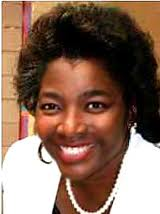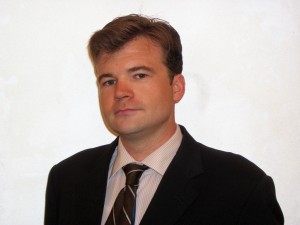Recently I attended the American Federation for Children’s policy summit in Washington, D.C. This event was an exciting, informative, two-day conference filled with panel discussions, keynote speakers such as Lisa Leslie and Mike McCurry, and networking opportunities with education reformers from all over the country. I left D.C. feeling similar to when I left the Foundation for Excellence in Education conference this past November. Invigorated. Energized. Hopeful.

Alberta Wilson: "Parents should be involved. They are the stewards of their children. If we continue to do things as we are doing them, we won’t be successful."
But I also kept thinking these events should be experienced and enhanced, a thousand times over, by one very important, and missing, demographic.
Parents.
My background is important, but not necessarily the reason, why I want to see more parents at education conferences throughout the country. I have been a Democratic activist and community organizer for the last 25 years. I now organize parents for Step Up For Students. Perhaps that does influence my thoughts and opinions.
However, I remember suggesting more parental involvement after attending education conferences as a teacher. I simply expect more now. I expect parents to be included in every substantive event, conference, policy discussion, roundtable, and town hall meeting, and I’m routinely disappointed when they aren’t anywhere to be found.
Of course, many of the participants are parents as well as education reformers. We bring that passion for school choice from personal experiences. I can talk about years spent driving my children out of county to put them in a public school that worked for them and then utilizing scholarships a few years later when a private school better fit their needs.
But we should hear more stories from a diverse population of moms and dads.
At the AFC Conference, Dr. Alberta Wilson, president and CEO of Faith First Educational Assistance Corp. and consultant for Capstone Legacy Foundation, shared my concerns. At several sessions, she spoke from the audience to implore that more parents be included – at every level.
I caught up with her recently and asked her to elaborate. (more…)
Indiana: Republican lawmakers scale back a proposal to eliminate a requirement that students attend public schools for one year before becoming eligible for a private school voucher (Associated Press). They pass it mostly along party lines in the House (Associated Press). They're advancing a proposal to switch administration of the voucher program away from newly elected Superintendent Glenda Ritz (Associated Press). They're also considering a Democratic proposal to give school districts with more than 50 percent of their students in charter schools the ability to approve new charters (Post Tribune).
 New Hampshire: The state House votes to repeal the tax credit scholarship program passed into law last year over Gov. John Lynch's vote (New Hampshire Public Radio).
New Hampshire: The state House votes to repeal the tax credit scholarship program passed into law last year over Gov. John Lynch's vote (New Hampshire Public Radio).
Iowa: The state's Catholic bishops push for vouchers (Iowa Radio).
Texas: Senate Education Committee Chairman Dan Patrick, R-Houston, files legislation to lift the cap on charter schools and create a new body to authorize them (Texas Tribune). More from the Austin American Statesman and the News-Journal. Patrick's proposal for tax credit scholarships isn't getting a warm reception from fellow lawmakers (San Antonio Express News). Thousands of people turn out for a Save Our Schools rally to restore education funding, reduce standardized testing and oppose vouchers and charter schools (KVUE.com)
Alaska: A debate over a proposed constitutional amendment that could open the door to private school vouchers is heating up (Anchorage Daily News). The chair of the Senate Education Committee says his committee will still hold hearings on vouchers even though it will no longer be considering a bill on the proposed amendment (Alaska Public Radio News).
California: The race for three seats on the L0s Angeles Unified School Board has drawn national interest - and financial support - due to three candidates who favor parental choice, charter growth and data-based teacher evaluations (Los Angeles Daily News).
Idaho: Lawmakers propose measures to allot charter schools $1.4 million in facilities funding and allow colleges, universities and nonprofit groups to authorize charter schools (Idaho State Journal). More from Idaho Education News.
Georgia: Amid the debate on parent trigger laws and charter schools, one education advocate ponders: Whose responsibility is it to educate a child — society’s or the parent’s? (Atlanta Journal Constitution). The Georgia Legislature considers an expansion of the tax-credit scholarship program (Rome News Tribune). (more…)
More Rubio vouchers. U.S. Sen. Marco Rubio needs a Florida-style coalition - meaning some Democratic lawmakers who see the value in expanded school choice - to get his plan for federal tax credit scholarships off the ground, writes Adam Emerson at the Choice Words blog. Education Week logs it in.
 More tutoring oversight. In light of abuses, the state-mandated program - which allows low-income parents to choose and access private tutors - should be scrapped, editorializes the Tampa Bay Times. The Miami Herald editorial board offers a more measured response, calling for better oversight and more regulatory accountability but acknowledging the predicament of low-income parents.
More tutoring oversight. In light of abuses, the state-mandated program - which allows low-income parents to choose and access private tutors - should be scrapped, editorializes the Tampa Bay Times. The Miami Herald editorial board offers a more measured response, calling for better oversight and more regulatory accountability but acknowledging the predicament of low-income parents.
More parent trigger. Florida Times Union. FCIR.
Wall of shame. At Jefferson High in Tampa, teachers keep tabs on embarrassing questions from students with a "Wall of Shame" in the teachers' lounge. Tampa Bay Times.
School safety. A 14-year-old is arrested for allegedly molesting an 8-year-old at a school for special needs students in Clearwater. Tampa Bay Times.
Charter schools. Teachers need more options, too, says Senate President Don Gaetz, reports StateImpact Florida. A growing number of charters in Palm Beach County increasingly pits independent charters against charter networks, reports the Palm Beach Post.
Magnet schools. Palm Beach district officials hope they can land a federal grant to create and bolster magnets at three underutilized schools. Palm Beach Post.
Dual enrollment. Growing numbers of students are taking the classes, raising concerns about state college costs and high school curriculum. Tampa Bay Times. (more…)
California: A parents group in Los Angeles is using the state's landmark parent trigger law to force the school district to reform a low-performing school. (Los Angeles Times). More from the Associated Press and Education Week. A national report finds the state continues to lead the nation in charter school growth, despite funding disparities and access to facilities (Huffington Post). Oakland district officials say the American Indian Model Schools, a charter network touted for its academic successes, suffers from "corrupt fiscal practices" and should be shut down (Oakland Tribune).
 Michigan: A new report finds the typical Michigan charter school student school gained more learning in a year than a district school peer, amounting to about an additional two months of reading and math learning (The Detroit News).
Michigan: A new report finds the typical Michigan charter school student school gained more learning in a year than a district school peer, amounting to about an additional two months of reading and math learning (The Detroit News).
Texas: Key state lawmakers are looking at the franchise tax on businesses as a vehicle to fund private-school scholarships for low-income students (Austin Business Journal). Critics of a proposed voucher program say all it will strip the public school system of funding and state leaders should instead restore $5.4 billion cut from education in 2011 (KUT News). Similar arguments in stories from KX11.com and the Associated Press.
Florida: Magnet schools continue to grow on the school choice landscape (redefinED). A new bill would require emergency response agencies to notify private schools just like they do public schools (redefinED). In response to the Newtown tragedy, private schools and charter schools are considering additional security measures too (redefinED).
Georgia: Tax credit scholarships are used at private schools that bar gay students (New York Times). (more…)
 News about Catholic schools in the U.S. usually isn't good. Rarely a week goes by without a headline about another one closing and, with it, a neighborhood institution that for generations brought high-quality education to often low-income families. So what a nice change to see another local story about a Catholic school in Tampa, for years on the brink of closing, making a comeback.
News about Catholic schools in the U.S. usually isn't good. Rarely a week goes by without a headline about another one closing and, with it, a neighborhood institution that for generations brought high-quality education to often low-income families. So what a nice change to see another local story about a Catholic school in Tampa, for years on the brink of closing, making a comeback.
Thanks to hard work and grit and a growth in tax-credit scholarships. St. Peter Claver recruited 163 students this year, up from 102 las year, according to today's Bay News 9 (which also took this photo). Ninety percent received tax credit scholarships, which are only available to families who qualify for free- or reduced-price lunch.
Increasingly, St. Peter Claver isn't an anomaly. The Wall Street Journal reported in June that, "Fo the first time in decades, Catholic education is showing signs of life." It continued: "Driven by expanding voucher programs, outreach to Hispanic Catholics and donations by business leaders, Catholic schools in several major cities are swinging back from closures and declining enrollment."
On a related note, another Tampa Bay area Catholic school, Sacred Heart in Pinellas Park, is holding a celebration this weekend to highlight its new partnership with the Notre Dame ACE Academies. As we've written before, the Notre Dame group is moving to take Catholic schools to a higher level, and it is using a couple of Tampa Bay schools as a model. Tax credit scholarships are key to its efforts to boost enrollment, particularly among Hispanics.
On an education landscape with more private options, these are signs of healthy ferment.
 Charter schools took a page from Catholic schools when they arrived in the 1990s and began their expansion – character development, solid discipline, a no-excuses approach to success for low-income kids. But now it's Catholic schools, struggling with declining enrollment (in part because of competition from charters), that should borrow good ideas from charters, the author of a new report says.
Charter schools took a page from Catholic schools when they arrived in the 1990s and began their expansion – character development, solid discipline, a no-excuses approach to success for low-income kids. But now it's Catholic schools, struggling with declining enrollment (in part because of competition from charters), that should borrow good ideas from charters, the author of a new report says.
Sean Kennedy, a visiting fellow at the Lexington Institute, points to how high-performing charter schools have embraced data and technology to better differentiate teaching, including use of “blended learning” models that have both improved student performance and reduced cost. “They’ve really invested in data,” Kennedy, a product of Catholic schools, said in the redefinED podcast below. “And that’s something that, unfortunately, for various cultural and just simply resource reasons, Catholic schools have shied away from.”
Kennedy says despite the funk they’re in, Catholic schools can more nimbly embrace promising trends than other education sectors and again stand out. They don’t have the bureaucratic or union entanglements of traditional public schools, and they still have the faith and character-building components in their favor.
“I’m very optimistic,” Kennedy said. Catholic school educators “often take huge pay cuts from what they would get in public schools. They often work much longer hours. And they love what they do. So if it can be presented to them in a way that this is going to benefit both their teaching and their students directly, I think teachers and administrators in Catholic education are at a special advantage to grab a hold of this data movement and really run with it.”
Kennedy also said vouchers and tax credit scholarships can be crucial in Catholic school reform efforts, particularly with Hispanic students. A project is now underway in the Tampa Bay area with two Catholic schools that accept tax credit scholarships and the Notre Dame ACE Academies, which aims to revitalize Catholic education. “There’s fewer and fewer kids in inner city areas being served by high quality Catholic schools, as these Catholic school business models kind of collapse in on themselves. And that’s a tragedy,” Kennedy said. “With the growing Hispanic population, there’s even greater need to serve these families.”
Editor's note: In our third installment of "blog stars," we're shifting course slightly. We'll continue to highlight posts from ed blogs. But if we stumble on a thoughtful newspaper column now and then, we'll throw that in the mix, too.
Rick Hess Straight Up: The Culture of 'Can't' in American Schools
 When it comes to reforming our nation's public schools, we hear a lot about what educational leaders can't do. Contracts, laws, and regulations assuredly handcuff school and system leaders. But the ardent drumbeat for "reform" has obscured the fact that school and system leaders can actually do much that they often complain they can't, if they have the persistence, knowledge, ingenuity, and motivation. In truth, it's tough to know how much blame should be apportioned to contracts and laws and how much to timid school boards and leaders who prize consensus and stakeholder buy-in ...
When it comes to reforming our nation's public schools, we hear a lot about what educational leaders can't do. Contracts, laws, and regulations assuredly handcuff school and system leaders. But the ardent drumbeat for "reform" has obscured the fact that school and system leaders can actually do much that they often complain they can't, if they have the persistence, knowledge, ingenuity, and motivation. In truth, it's tough to know how much blame should be apportioned to contracts and laws and how much to timid school boards and leaders who prize consensus and stakeholder buy-in ...
The problem is that in selecting, training, socializing, and rewarding leaders, we do not equip or encourage them to lead. Traditional educational leadership counsels tell leaders that they should rely wholly on coaching and consensus -- while placidly accepting contractual, bureaucratic, or policy barriers. Meanwhile, would-be reformers divert attention from lethargic leadership by rushing to blame "the union." Full post here.
Hartford Courant: A Eulogy For New London's St. Mary's School
That the school hung on until 2012 may be a minor miracle. The nuns are gone, but like other Catholic schools it managed to attract talented lay teachers willing to work for less than they would make at a public school. I chatted with the church's pastor, the Rev. Robert Washabaugh, who said a foundation called The Compass Fund has been a godsend to the school, helping many youngsters from low-income families — the traditional constituency of Catholic schools — make the $2,600 tuition. Alas, the recession caused the fund to cut back on its support.
What is particularly sad is that the school had come up with a good pedagogical plan. The school's 115 students today are 60 percent Latino, 30 percent African American and 10 percent Caucasian. Last year the school developed a dual language initiative, a plan that would make it the first Catholic school in the state to teach classes in English and Spanish. It was an excellent idea for 21st century America; sadly, the fiscal realities stopped it barely out of the gate.
In New London, where the public schools have struggled, St. Mary's was a great option for many families. At the risk of offending my friends at the ACLU, a situation such as this cries out for school vouchers. Religion and ethics aren't the worst problems these kids face. Full column here. (more…)
 A chain of Catholic, college-prep high schools that has demonstrated success with low-income students is eyeing two Florida cities for a possible expansion. Tampa and Miami are near the top of the list for the Chicago-based Cristo Rey Network, group president Rob Birdsell told redefinED. The reasons: A good job pool. The availability of tax credit scholarships. A need for more high-quality options for low-income kids. And maybe even some nudging from former Florida Gov. Jeb Bush.
A chain of Catholic, college-prep high schools that has demonstrated success with low-income students is eyeing two Florida cities for a possible expansion. Tampa and Miami are near the top of the list for the Chicago-based Cristo Rey Network, group president Rob Birdsell told redefinED. The reasons: A good job pool. The availability of tax credit scholarships. A need for more high-quality options for low-income kids. And maybe even some nudging from former Florida Gov. Jeb Bush.
“We very much want to get to Florida,” Birdsell said in a phone interview. “Gov. Bush is a friend of Cristo Rey (and) he is persistent.”
Lauded by education reformers and others for innovative work with Hispanic and African American students (see if you can get through this “60 Minutes” piece without crying), Cristo Rey now operates 24 Catholic high schools in 17 states and the District of Columbia. Its students typically come in two grade levels behind. But 84 percent of those who graduate enroll in college.
The students pay more than half of the $12,000 average tuition through a corporate work study program that gives them real-world experience at banks, hospitals, law firms and other partners. Accessing Florida’s tax credit scholarship program – worth $4,335 per student this fall – would fill out most of the remaining gap. That would take pressure off both the families and the network’s fundraisers. (more…)
 Colorado: Former Florida Gov. Jeb Bush lays out his education reform formula, with expanded school choice a key plank. (Education News Colorado)
Colorado: Former Florida Gov. Jeb Bush lays out his education reform formula, with expanded school choice a key plank. (Education News Colorado)
Pennsylvania: Hundreds of Catholic school students in Philadelphia rally for a voucher bill. (CBS Philly)
Michigan: State lawmakers consider funding cyber schools on performance rather than enrollment. (MLive.com)
Washington: Expanded school choice in the form of charter schools - Washington is one of the few states without any - is an issue in the governor's race. (Seattle Times) (more…)